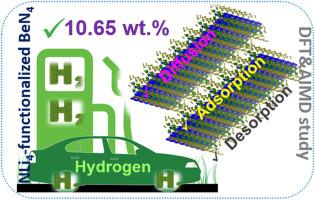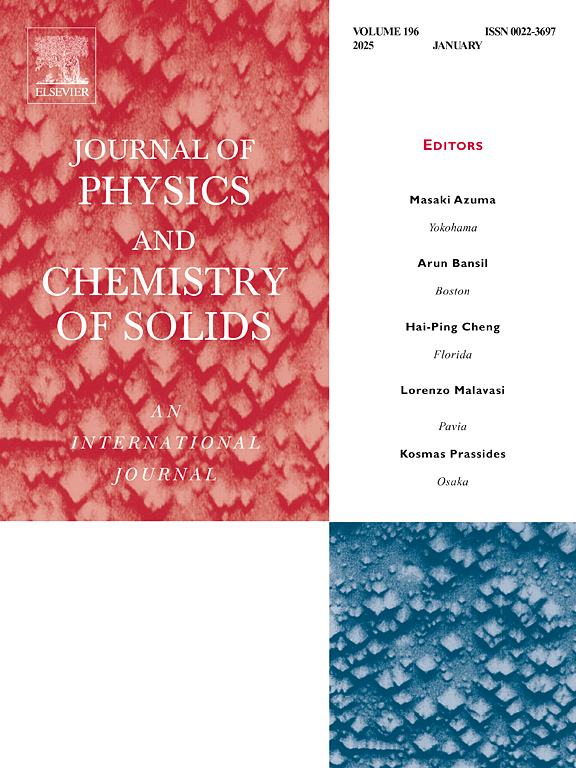超碱NLi4功能化2D-BeN4作为有前途的储氢介质:从头算DFT和AIMD研究
IF 4.9
3区 材料科学
Q2 CHEMISTRY, MULTIDISCIPLINARY
引用次数: 0
摘要
利用密度泛函理论和分子动力学计算,开发了一种NLi4簇化多氮化铍纳米片,作为一种新型储氢系统。在NLi4功能化的两侧,吸附能均为−3.33 eV,表明超碱NLi4与BeN4单层之间存在很强的吸引力。在氢饱和后,2NLi4@BeN4系统能够吸附28个氢分子,达到10.65 wt%的氢重量容量,超过了美国能源部设定的监管目标。分子动力学计算揭示了H2分子的可逆性,H2分子饱和的BeN4单层的结构和热稳定性。在范霍夫公式的基础上,对分解温度的研究表明了氢分子在环境条件下储存可逆性的潜力。最小的活化能表明H2分子在吸附/解吸过程中可以在NLi4@BeN4材料上快速移动。nli4功能化BeN4的能量特性和高储氢容量使其成为储氢应用的理想候选者。本文章由计算机程序翻译,如有差异,请以英文原文为准。

Superalkali NLi4 functionalized 2D-BeN4 as a promising hydrogen storage medium: An ab initio DFT and AIMD investigations
Using density functional theory and molecular dynamics calculations, an NLi4 cluster-functionalized beryllium polynitride nanosheet has been developed as a novel system for hydrogen storage applications. On both sides of NLi4 functionalization, the adsorption energy measures −3.33 eV, suggesting a strong attraction between the superalkali NLi4 and BeN4 monolayer. After hydrogen saturation, the 2NLi4@BeN4 system demonstrates the capability to adsorb 28 hydrogen molecules, achieving a hydrogen gravimetric capacity of 10.65 wt%, surpassing the regulatory targets set by the US-DoE. Molecular dynamics calculations reveal the reversibility of H2 molecules, the structural and thermal stability of the H2 molecule-saturated BeN4 monolayer. Based on the Van't Hoff formula, studies on decomposition temperature indicate the potential for hydrogen molecule storage reversibility under ambient conditions. The minimal activation energy suggests that H2 molecules can move swiftly on the NLi4@BeN4 materials during adsorption/desorption processes. The energetic properties and high hydrogen capacity of NLi4-functionalized BeN4 make it an ideal candidate for hydrogen storage applications.
求助全文
通过发布文献求助,成功后即可免费获取论文全文。
去求助
来源期刊
CiteScore
7.80
自引率
2.50%
发文量
605
审稿时长
40 days
期刊介绍:
The Journal of Physics and Chemistry of Solids is a well-established international medium for publication of archival research in condensed matter and materials sciences. Areas of interest broadly include experimental and theoretical research on electronic, magnetic, spectroscopic and structural properties as well as the statistical mechanics and thermodynamics of materials. The focus is on gaining physical and chemical insight into the properties and potential applications of condensed matter systems.
Within the broad scope of the journal, beyond regular contributions, the editors have identified submissions in the following areas of physics and chemistry of solids to be of special current interest to the journal:
Low-dimensional systems
Exotic states of quantum electron matter including topological phases
Energy conversion and storage
Interfaces, nanoparticles and catalysts.

 求助内容:
求助内容: 应助结果提醒方式:
应助结果提醒方式:


